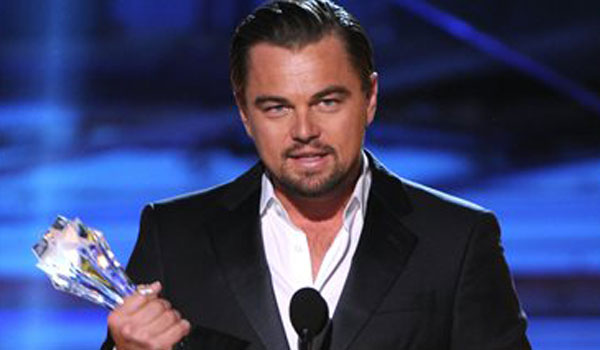From troubled youth to new ‘king’ of Hollywood
In our view, one of the biggest winners at last week’s Golden Globe Awards was Leonardo DiCaprio, star of Martin Scorsese’s “The Wolf of Wall Street.” The TV-film tilt had other major and “upset” victors, but Leo stands out because his Best Actor (Comedy/Musical) award symbolizes the apex of his difficult, career-long self-transformation, from a sensitive to even troubled child actor to the veritable King of Hollywood he has become today.
Leo’s early film outing as a child actor, “Poison Ivy” in 1992, underscored early on his penchant for portraying moody characters, casting him as a member of a dysfunctional family that’s insidiously influenced by a troubled teenager (Drew Barrymore). Leo’s “angelic” looks contrasted dramatically with his “sensitive” and even disturbed psychological projection.
His second film, “What’s Eating Gilbert Grape?,” further underscored his overly sensitive, “loner” characterization. In the dark drama, Johnny Depp played a young man in a dead-end town saddled with the responsibility of caring for his retarded younger brother (Leo).
Eye-opener
Article continues after this advertisement
The film was credited with “first-rate performances,” and it’s interesting that, at this early stage of their respective careers, both Johnny and Leo were making their mark as “moody” players who could effectively play drifters, retardates and such.
Article continues after this advertisementAlso significant is the fact that, years later, both actors were able to emerge from their early films’ cocoon of “troubled” characterization, and become the mainstream superstars they are now!
“This Boy’s Life” was billed as a “harrowing but absorbing story, set in the 1950s, of a young boy (Leo) and his footloose mother who wind up living with a lout who beats up the boy, both physically and psychologically.” For the first time, Leo was singled out for his exceptional portrayal: “The film includes an eye-opener for young DiCaprio.”
In “Total Eclipse,” Leo moved up to costarring rank and was made to play the exceedingly challenging role of the fiercely talented and troubled young French symbolist poet, Arthur Rimbaud.
Unfortunately, the “artistic” film wasn’t a success, and “The Quick and the Dead” didn’t advance Leo’s prospects, either.
“The Basketball Diaries” fared better, and a capsule review noted that Leo was “well-cast” as 1960s poet-musician Jim Carroll, but his career at this point clearly needed a major boost to push him to the next level of young stardom.
Romantic thriller
“Romeo + Juliet” (1996), reworked by Baz Luhrmann, did exactly that, making Leo’s overly “sensitive” and morose screen image romantically thrilling for a new generation of teen viewers. A reviewer gushed: “What keeps this film alive is the earnestness of the two youthful leads (Leo and Claire Danes), whose passion for one another is tangible and appealing.”
Having successfully established himself as the young male lead of the movie moment, Leo made such films as “Marvin’s Room,” “The Man in the Iron Mask,” “Celebrity,” “The Beach” and “Catch Me If You Can.”
It was via the mega-hit, “Titanic,” in 1997, that his star really shot up to stratospheric heights. But, that wasn’t the end of his self-transformation into the movie king that he is today. That came courtesy of his new mentor, Scorsese, who brought out the best and the “beast” in Leo by way of the five “liberating” movies they’ve made, starting with “Gangs of New York” in 2002.
